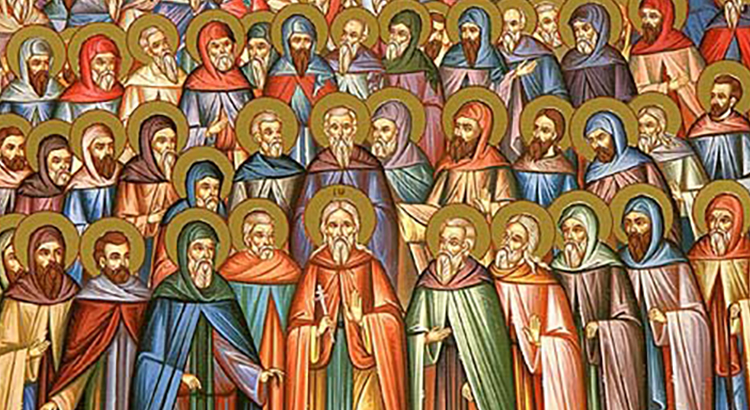Memory of the Saints and the Prophets
Reading of the Word of God
Alleluia, alleluia, alleluia
You are a chosen race,
a royal priesthood, a holy nation,
a people acquired by God
to proclaim his marvellous works.
Alleluia, alleluia, alleluia
Acts 20,28-38
'Be on your guard for yourselves and for all the flock of which the Holy Spirit has made you the guardians, to feed the Church of God which he bought with the blood of his own Son. 'I know quite well that when I have gone fierce wolves will invade you and will have no mercy on the flock. Even from your own ranks there will be men coming forward with a travesty of the truth on their lips to induce the disciples to follow them. So be on your guard, remembering how night and day for three years I never slackened in counselling each one of you with tears. And now I commend you to God and to the word of his grace that has power to build you up and to give you your inheritance among all the sanctified. 'I have never asked anyone for money or clothes; you know for yourselves that these hands of mine earned enough to meet my needs and those of my companions. By every means I have shown you that we must exert ourselves in this way to support the weak, remembering the words of the Lord Jesus, who himself said, "There is more happiness in giving than in receiving." ' When he had finished speaking he knelt down with them all and prayed. By now they were all in tears; they put their arms round Paul's neck and kissed him; what saddened them most was his saying they would never see his face again. Then they escorted him to the ship.
Alleluia, alleluia, alleluia
You will be holy,
because I am holy, thus says the Lord.
Alleluia, alleluia, alleluia
Paul exhorts the elders of Ephesus to watch over themselves, as he did, without sparing themselves in anything. He knows that Christian life is not simply fruit of the good will of individuals. It is the Lord who gives the strength and wisdom to live according to the Gospel. This is why he tells them, "I commend you to God and to the message of his grace." After this exhortation, Paul is about to conclude his speech and recalls his personal relationship with the poor: he helped them with the work of his hands. He never sought wealth for himself, but furthermore he supported himself with the work of his hands. He reaffirms that it is a primary obligation for Christians to "support the weak." It is the first time that the term "weak" (astenos, that is without strength, without vigour) is used in the New Testament to refer to the poor in general. The author of the Acts here encapsulates the entire doctrine on Christian mercy. First of all showing that the verb "to support" means to "take care of," that is to feel personally responsible for the weak. Then by reporting a splendid "say" of Jesus by which Paul summarizes the entire life of believers: "It is more blessed to give than to receive." Jesus had said: "Give, and it will be given to you" (Lk 6:38). The Didache gathers this teaching with the passage, "Give to all who ask you, and do not ask for it back for the Father wishes that all people should receive from his own gifts. Blessed are those who give according to the command, for they are blameless." This is the concrete sense of gratuitousness that defines Jesus ‘ love who come to serve and not to be served, to give for free without being given anything back.
